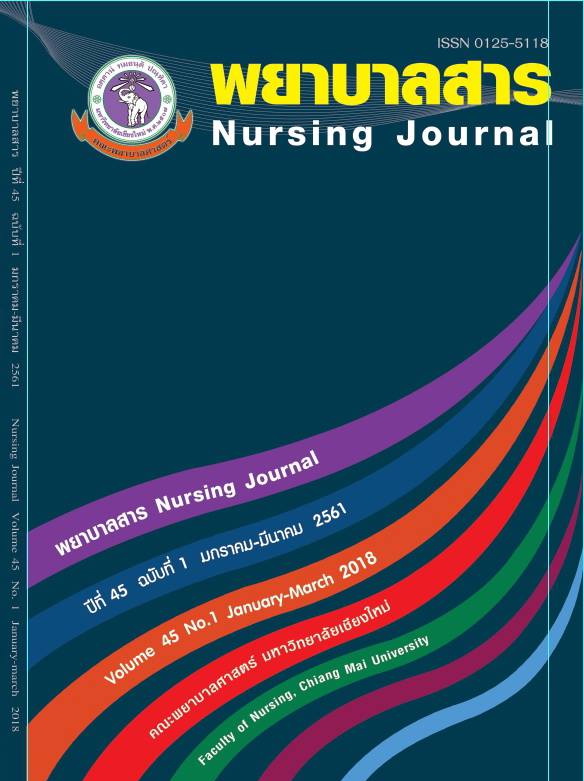Effect of Emotional Quotient Promoting Program on Emotional Quotient Among Nursing Students
Keywords:
emotional quotient promoting program, emotional quotient, nursing studentAbstract
Emotional quotient is an emotional ability to live creatively and happily. Promoting emotional quotient among nursing students is very essential. This research was a quasi-experimental research using control and experimental groups. The purposes of this study was to examine the effect of emotional quotient promoting program among nursing students. The samples were first-year nursing students. There were 52 cases: 26 in the experimental group and 26 in the control group, using simple random sampling. The study was conducted between March to May, 2017. The experimental group received the emotional quotient promoting program. The control group did not participate in program. The research instruments included the emotional quotient promoting program, the personal data questionnaire, and the emotional quotient questionnaire. Data were analyzed using descriptive statistic, Mann-Whitney U test, and Wilcoxon signed rank test.
The research found that the mean score of emotional quotient of the experimental group receiving the emotional quotient promoting program was statistically higher than that of the control group who did not receive the program at p < .05. In addition, the mean score of emotional quotient of the experimental group after receiving the emotional quotient promoting program was statistically higher than that of before at p < .001.
The results of this research indicate that the emotional quotient promotion program could improve the emotional quotient of nursing students. Emotional quotient promotion should be continually with regular education.
References
. (2550). คู่มือการจัดกิจกรรม “ฝึกการคิดแก้ปัญหาพัฒนา EQ”สำหรับศูนย์เพื่อนใจวัยรุ่น.พิมพ์ครั้งที่ 7. นนทบุรี : ชุมชนสหกรณ์การเกษตรแห่งประเทศไทย.
คณะพยาบาลศาสตร์ วิทยาลัยเชียงราย. หลักสูตรพยาบาลศาสตรบัณฑิต(ฉบับปรับปรุง)พ.ศ. 2555. เอกสารอัดสำเนา.
เทอดศักด์ เดชคง.(2546).ความฉลาดทางอารมณ์จากทฤษฎีสู่การปฏิบัติ.พิมพ์ครั้งที่ 2. กรุงเทพมหานคร:สำนักพิมพ์มติชน.
พรรณวิไล ศรียาภรณ์, ปิยะนุช ชูโต, บังอร ศุภวิทิตพัฒนา และกัลยาณี ตันตภนนท์. (2556). การพัฒนาการเรียนรู้เชิงประสบการณ์เพื่อเสริมสร้างคุณธรรม จริยธรรมในการปฏิบัติการพยาบาลในระยะหลังคลอดของนักศึกษาพยาบาลชั้นปีที่ 4. พยาบาลสาร, 40(1),74-88.
วนิดา ชนินทยุทธวงศ์.(บรรณาธิการ).(2543).คู่มือการฝึกอบรมแบบมีส่วนร่วม.นนทบุรี : วงศ์กมล โปรดักชั่น.
วรรณนภา ด่านธนวานิช. (2556). รายงานการวิจัย เรื่องผลของโปรแกรมพัฒนาความฉลาดทางอารมณ์ต่อความฉลาดทางอารมณ์ของวัยรุ่น. วารสารโรงพยาบาลพิจิตร,28(1),50-61.
วิไล เกิดผล และพิเชษฐ เรืองสุขสุด.(2553). รายงานการวิจัย เรื่องผลของการพัฒนาทักษะชีวิตต่อความฉลาดทางอารมณ์ของนักศึกษาพยาบาล.วารสารพยาบาลศาสตร์และสุขภาพ,33(1),10-21.
วิลัยพร นุชสุธรรม. (2559). รายงานการวิจัย เรื่องความฉลาดทางอารมณ์ของนักศึกษาพยาบาล คณะพยาบาลศาสตร์ วิทยาลัยเชียงราย. วารสารการพัฒนาสุขภาพชุมชน,4(4),505-519.
สุวิทย์ มูลคำและอรทัย มูลคำ.(2547).19 วิธีการจัดการเรียนรู้เพื่อพัฒนาความรู้และทักษะ.กรุงเทพมหานคร : ภาพพิมพ์.
สำนักงานคณะกรรมการการอุดมศึกษา. (2556). แผนพัฒนาการศึกษาระดับอุดมศึกษา ฉบับที่ 11 (พ.ศ. 2555-2559). กรุงเทพมหานคร : โรงพิมพ์แห่งจุฬาลงกรณ์มหาวิทยาลัย.
อุษณีย์ เทพวรชัย, ประภารัตน์ ทวีเกียรติตระกูล และเพ็ญพรรณ ขจรศิลป์. (2550). กิจกรรมการพัฒนาความฉลาดทางอารมณ์สำหรับนักศึกษาพยาบาล.วารสารวิจัยทางวิทยาศาสตร์สุขภาพ,1(1),10-16.
Burns N. & Grove S. (2009)The Practice of Nursing Research: appraisal, synthesis, and generation of evidence (6thed.). St. Louis: W. B. Saunders.
Charoensukmongkol P. (2014). Benefits of Mindfulness Meditation on Emotional Intelligence General Self-Efficacy and Perceived Stress : Evidence from Thailand, Journal of Spirituality in Mental Health,Retrieved form http://www.tandfonline.com/loi/wspi20.
Kolb DA, Rubin IM, Osland JS. (1991). Organizational Behavior An Experiential approach. (5thed.). Engle weed : Prentice hall.
Polit DF. & Hungler BP.(1999).Nursing research principle and method. (6thed.). Philadelphia : Lippicott William & Wilinks.
Hamer LO. (2000). The additive effects of semi - structured classroom activities on student learning : An application of classroom – based experiential learning techniques. Journal of marketing education, 22(1),25-34.
Goleman D. (1998). Working with Emotional Intelligence. New York : Bantom books.
Translated Thai References
Chanintayutwong W. (Editor).(2000). Participatory Training Manual. Nonthaburi: Wongkamol Productions.
Dantanvanich W. (2013). Effect of Emotional Quotient Enhancement Program on Emotional Quotient of Adolescent. Journal of Pichit Hospital, 28 (1), 50-61.
Dechkong T. (2003). Emotional Quotient from theory to practice. (2nd ed.). Bangkok : Matichon Publishing.
Department of Mental Health, Ministry of Public Health.(2007). EQ : Emotional Quotient. (4thed.). Nonthaburi: Agricultural Cooperative Society of Thailand.
. (2007). Activity Guide "Developmental problem solving EQ” for Friend Corner (7thed.). Nonthaburi : Agricultural Cooperative Society of Thailand.
Faculty of Nursing Chiang rai College. Bachelor of Nursing Program (Revised Edition) 2012. Copier documentation.
Kirdpole W. and Reungsuksud P. (2010). Effects of Life Skills Development on Emotional Quotient Among Nursing Students. Journal of Nursing Science of Health, 33(1),10-21.
Mulkum S. and Mulkum O. (2004) .19 How to Manage Learning to Improve Knowledge and Skills. Bangkok : Phapphim.
Nuchsutham W. (2016). Emotional Quotient of Nursing Students, Faculty of Nursing Chiang rai College. Community Health Development Quarterly,4(4),505-519.
Office of the Higher Education Commission. (2013) Higher Education Development Plan No. 11 (2012-2016). Bangkok: Chulalongkorn University Printing House.
Sriareporn P, Xuto P, Supavititpatana B and Tantranont K. (2013). Development of Experienced Learning Activities for the Moral and Ethical Promotion During Practicing in Postpartum Care of the Fourth Year Nursing Students. Nursing Journal, 40(1),74-88.
Tepworachai A, Tawegiattragoon P, and Kajornsil P. (2007). Emotional Quotient Development Activities for Nursing Students. Journal of Health Science.1(1),10-16.
Downloads
Published
How to Cite
Issue
Section
License
บทความที่ได้รับการตีพิมพ์เป็นลิขสิทธิ์ของวารสารพยาบาลสาร
ข้อความที่ปรากฏในบทความแต่ละเรื่องในวารสารวิชาการเล่มนี้เป็นความคิดเห็นส่วนตัวของผู้เขียนแต่ละท่านไม่เกี่ยวข้องกับมหาวิทยาลัยเชียงใหม่ และคณาจารย์ท่านอื่นๆในมหาวิทยาลัยฯ แต่อย่างใด ความรับผิดชอบองค์ประกอบทั้งหมดของบทความแต่ละเรื่องเป็นของผู้เขียนแต่ละท่าน หากมีความผิดพลาดใด ๆ ผู้เขียนแต่ละท่านจะรับผิดชอบบทความของตนเองแต่ผู้เดียว






